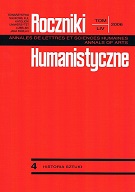Pałac Potockich w Lublinie w świetle osiemnastowiecznych źródeł
The Potocki Palace in Lublin in the Light of Eighteenth-century Sources
Author(s): Krzysztof GombinSubject(s): Architecture
Published by: Towarzystwo Naukowe KUL & Katolicki Uniwersytet Lubelski Jana Pawła II
Keywords: decorations; nobility; palace; portraits; Potocki; rococo; royal
Summary/Abstract: The Potocki palace in Lublin was for the first mentioned in the sources in 1734. It is not, however, on the plan of Chevalier d’Orxen of 1716, hence it was constructed between those years. It was built for Jerzy Potocki, and most probably was ready in 1730, when his sone, Eustachy, studied at the Lublin Jesuit college. There are no hints that the palace built in the times of Jerzy Potocki was something special with regard to its artistic class and scale. The magnate stayed mainly in Serniki, where he lived in a small wooden mansion of little artistic value. It is there where his sons were born. The fact that the Lublin seat was not a representative building, fit for a bigger event, is evidenced when Eustachy Potocki’s wedding with Marianna née Ka˛tska (December 1741) was organised in August Czartoryski’s neighbouring palace. The construction and modernisation works in the Potocki palace, as evidenced by the sources, were conducted as late as the 1750s, already after Jerzy Potocki’s death, when its owner was Eustachy. It follows from Eustachy’s correspondence, now in the Main Archives of the Ancient Acts in Warszawa and in the State Archives in Kraków (the branch at Wawel), that some sentences about the Lublin palace can be found. Thus between January and the beginning of April 1755 the side pavilions were covered with a new shingle, mirrors were imported, curtains and upholstery were installed; glass, lead, calcium, and plaster were used for some unidentified works. They were all related to Eustachy’s function of the marshal of the Crown Tribunal, which he took in 1754, and needed a seat appropriate to this rank. During the proceedings of the Tribunal in Potocki’s palace there were festive receptions and balls: on the occasion of the king’s, president’s, the marshal’s, or hetman Jan Klemens Branicki’s nameday; another event was when a Turkish parliament member stayed in the palace, or the Tribunal’s limit. Eustachy Potocki’s son, Stanisław Kostka, was born in the Lublin palace. (...)
Journal: Roczniki Humanistyczne
- Issue Year: 54/2006
- Issue No: 04
- Page Range: 291-305
- Page Count: 15
- Language: Polish

